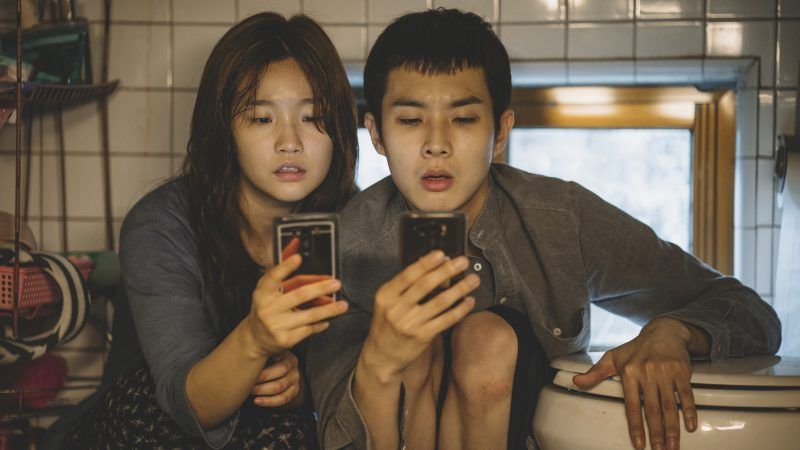Review: Parasite
Bong Joon-ho’s very wild ride.

The movie you may think you're about to watch as Parasite gets underway would surely be a lot of fun even if it only played out as you expected—as a lively farce about the eternal class war between the arrogant rich and the scheming poors. That actually could describe this latest film from the (no other word) brilliant South Korean director Bong Joon-ho. It does not, however, come near to describing it in its full, dazzling, hilarious and bloody complexity.
In a scrubby precinct of present-day Seoul, the Kim family—mother, father, daughter, son—lives a life of unquiet desperation. The only money they have coming in is earned folding pizza boxes for a nearby restaurant. In order to deal with a nasty stink-bug problem in their cramped basement apartment, they open the street-level windows whenever a municipal bug-spray truck passes by outside and then gasp and choke as the purging fumes roll into their home. Much of their time is spent scampering around the apartment in search of a free wifi signal
Times are tough for the Kims, but they're close-knit and affectionately supportive of one another, and they always scrape by. Then the son of the family, Ki-woo (Choi Woo-sik), receives an attractive proposition from a friend, a college student named Min (Park Seo-joon). Min has been making nice money on the side as an English tutor for a rich girl named Park Da-hye (Jung Ziso). But Min is now moving abroad, so he offers this cushy gig to Ki-woo. Ki-woo objects that he lacks the college degree the job requires, but Min says that's not really a problem, and he's right—Ki-woo's endearingly sassy sister, Ki-jung (Park So-dam), employs her digital wizardry to simply run up a fake diploma for him on a computer.
When Ki-woo arrives at the Park family's home—well, gated compound—he realizes he's stepped into another world. The lawn is huge; the floors of the knockout house are polished marble and the walls are painted aggressively tasteful shades of beige and grey. The living room could accommodate the Kim family's entire apartment. Ki-woo realizes he could get used to this.
In the course of tutoring Da-hye, Ki-woo carefully observes the rest of the Parks at close hand. The father, Dong-ik (Lee Sun-kyun), is a coolly prosperous tech-something or other who spends quite a bit of every day being chauffeured around in his gleaming Mercedes and wrinkling his nose at any poor people he might encounter (he dislikes the smell of poverty). His sweetly flustered wife, Yeon-kyo (Jo Yeo-jeong), has too much time on her hands and uses most of it to obsess about status signaling and the material superiority of all things Western. (For no reason at all, she has decided to call Ki-woo "Kevin.")
Of most immediate interest to Ki-woo is the Parks' little boy, Da-song (Jung Hyun-jun). Mrs. Park is convinced Da-song has artistic talent (an "eccentric genius," she calls him), and Ki-woo, appraising the boy's sloppy paintings, allows that they might demonstrate an ambiguous "Basquiat sense." What the boy needs, clearly, is an art tutor—and Ki-woo happens to know one. In no time at all, his sister Ki-jung—a gifted scammer—has arrived at the Parks' home, trailing clouds of art-speak that she picked up on Google.
The movie is, among several other things, a wild home-invasion thriller. With the Kim kids now gainfully employed in the Park household, the question becomes how to bring their mom (Jang Hye-jin) and dad (Song Kang-ho) aboard this gravy train. It isn't easy—there are other people in the way. But screw them. By dint of some very clever cons, the entire Kim family is soon reunited inside the plush Park domicile. At this point, you could tack on another half hour or so of amusing antics and have a pretty entertaining movie. But director Bong is only getting started.
I wish I could describe the maniacal twists with which he and cowriter Han Jin Won have salted the story, the ingenious plot surprises they keep rolling out right down to the very last scene. But no. There's no way to say anything further about this movie—a movie about which so much begs to be said—without spoiling it for anyone who hasn't seen it. Let me only note that, while Parasite is obviously a work of social observation, it's not as schematic as Snowpiercer, Bong's 2013 feature about a long train speeding through the snowy wastes of a ruined world, and the proletarian revolution that spurs oppressed Third Class passengers to battle their way up into the balmy environs of First. Parasite isn't metaphorical, and no one is lecturing us about the injustices we see, either. But we're nodding our heads anyway.


Show Comments (5)